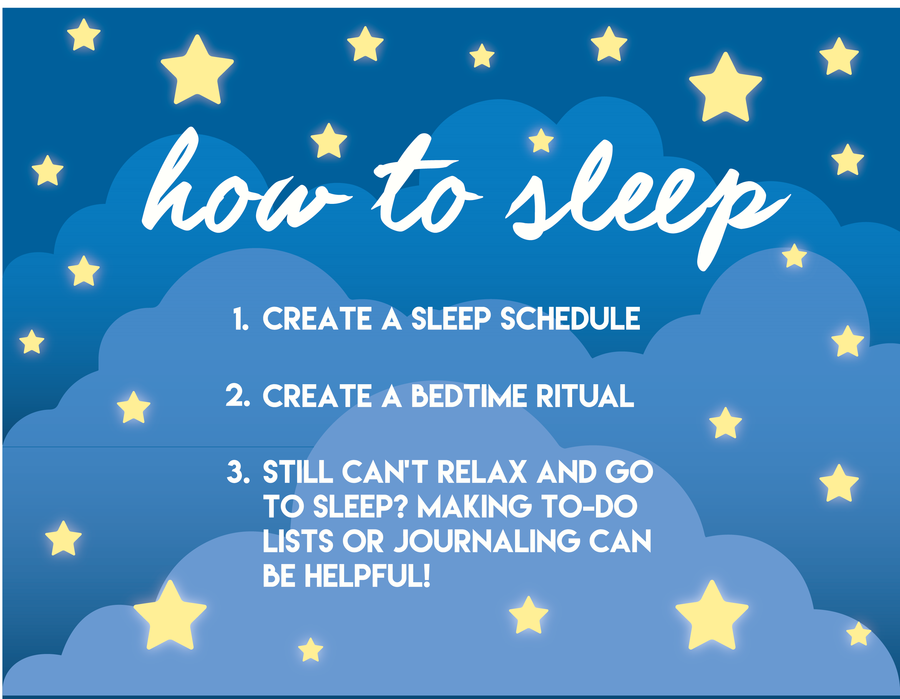Tests, group projects, nightly homework and a hefty class schedule can take a toll on a student’s sleep cycle. It feels like there aren’t enough hours in a day to get everything accomplished, so students typically sacrifice their seven to eight hours of sleep to accomplish more. Even though the work gets done, falling behind on sleep isn’t good for students’ [brains and overall health](http://mentalfloss.com/article/65215/9-ways-not-getting-enough-sleep-ruins-your-health).
The brain goes to sleep each night so it can create new pathways to help a person learn and remember information, [according to the NIH](https://www.nhlbi.nih.gov/health/health-topics/topics/sdd/why). That alone is a good incentive for college students to maintain healthy sleeping habits. Try some of MOVE’s tips to get you there:
####1) Create a sleep schedule
Going to sleep and waking up at the same time every day creates consistency, making for a better night’s sleep. Once it becomes habit, the body will begin to feel tired around the determined bedtime and awake around the time the alarm rings. It’s best to strive for seven to eight hours of sleep, and you can plan this schedule with the iPhone’s Clock app under “Bedtime.” It’s easy to use and see how many hours of sleep you’ve scheduled. This app also tracks your sleep so you can check your sleep history.
If you don’t have an iPhone, there are other [apps](http://clark.com/health-health-care/apps-that-help-you-get-better-sleep/) out there that track sleep as well. The Sleep Cycle app monitors your sleep and will sound an alarm when it notices when you’re in your lightest sleep cycle within a 30-minute time frame that you designate. Waking up out of a light sleep cycle is easier than waking up out of a deep sleep cycle, so you’ll feel more rested and ready to start the day.
####2) Create a bedtime ritual
Now that you’ve set a time to go to sleep each night, it can be hard to actually follow it and fall asleep on time. So to help ease into sleep, pick a few relaxing activities to do before bedtime. Your body will also get accustomed to these new habits and realize that it’s almost time to sleep when you do them. But what’s a relaxing activity? Here are a few options to try:
If you’re into Netflix…
[Napflix](http://napflix.tv/) has 10 different categories of videos to choose from. These videos have mind-numbing content that will surely relax your brain, such as a video of the aurora borealis set to calming music. A timer feature is located on the top left corner, where the video will stop playing after 10, 20 or 30 minutes; by that time, you’re already fast asleep.
If you enjoy reading…
Because of all of the assigned reading college students get, it’s hard to get around to reading for fun. Pick up the book you’ve been putting off and read for an hour a night before you go to sleep. This takes your mind off of school work and is a relaxing activity that can prepare you for bed.
If music is your relaxation get-away…
Neuroscientists from Mindlab International have created a Spotify playlist with 10 relaxing songs that will have you drifting off to sleep in [no time](https://www.inc.com/melanie-curtin/neuroscience-says-listening-to-this-one-song-reduces-anxiety-by-up-to-65-percent.html?cid=cp01002mentalfloss). According to the scientists, one song in particular, [“Weightless” by Marconi Union](https://www.youtube.com/watch?v=UfcAVejslrU), reduces anxiety by up to 65 percent. This song is so effective that Dr. David Lewis-Hodgson warned people not to drive and listen to it because it can cause drowsiness.
####3) Still can’t relax and go to sleep?
Making [to-do lists or journaling](http://healthguides.healthgrades.com/getting-a-good-nights-sleep/journaling-before-bed-can-help-ward-off-sleeplessness) can be helpful. Everyone makes to-do lists, but with the workload all laid out, it can be more stress-inducing than relaxing. If you make an achievable list of things to do in one day the night before, you’ll have a fairly stress-free day. It feels good to get things accomplished and to strike them off the list throughout the day. At the day’s end, to feel even more relaxed after a productive day, write tomorrow’s to-do list. It’ll take those things off your mind, and you’ll have the rest of the evening to do what you want, like fall asleep.
_Edited by Katherine White | [email protected]_








